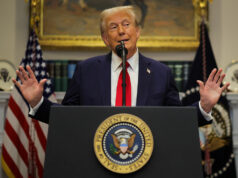China takeover of Taiwan would threaten US too, Taiwan president says

TAIPEI — A Chinese takeover of Taiwan would threaten US homeland interests and further embolden Beijing to compete with Washington on the international stage, President Lai Ching-te told a conservative US radio show and podcast in an interview.
The United States is Chinese-claimed Taiwan’s most important international backer, despite the absence of formal ties, but since President Donald J. Trump took office earlier this year, he has not announced any new arms sales to the island.
Mr. Trump could meet Chinese President Xi Jinping at a meeting of Asia-Pacific leaders in South Korea later this month.
Mr. Lai was asked this week on The Clay Travis and Buck Sexton Show — which is carried on more than 400 talk radio stations — what he would tell the US president if he were to meet him, and he said he would advise Mr. Trump to pay attention to Mr. Xi’s actions.
“I would advise him to pay particular attention to the fact that Xi Jinping is not only conducting increasingly large-scale military exercises in the Taiwan Strait, but is also expanding military forces in the East China Sea and South China Sea,” Mr. Lai said, according to a transcript of his remarks released by the presidential office on Tuesday.
China’s increasing military activities further and further from its own shores are not only a challenge for Taiwan, Mr. Lai said.
“The challenge extends beyond merely annexing Taiwan. Once Taiwan is annexed, China will gain greater strength to compete with the United States on the international stage, undermining the rules-based international order,” he said.
“Ultimately, this will also impact US homeland interests. Therefore, I hope President Trump will continue to uphold peace and stability in the Indo-Pacific.”
China’s foreign ministry did not immediately respond to a request for comment about Mr. Lai’s remarks.
Given the lack of formal ties, Taiwanese presidents do not speak directly to or meet US presidents.
Taiwan, along with major Western allies, has worked to address Washington’s concerns that it is not spending enough on its own defense — Mr. Lai has set a target of defense spending to reach 5% of gross domestic product by 2030.
“I will tell them that Taiwan is absolutely determined to safeguard its national security,” Mr. Lai told the show, when asked about how he would show the United States the island’s resolve to defend itself.
“When Taiwan protects itself, it is also committing to maintaining regional peace and stability,” he added.
The United States, which is bound by law to provide Taiwan with the means to defend itself, has long stuck to a policy of “strategic ambiguity,” not making clear whether it would respond militarily to a Chinese attack on Taiwan.
Mr. Lai rejects Beijing’s sovereignty claims, saying only the island’s people can decide their future. China calls Mr. Lai a “separatist” and has repeatedly rebuffed his offers of talks. — Reuters



